‘The Handmaid’s Tale’: A Harrowing Warning From a Fictional Future to a Tense Present
Ladies, hold onto your bonnets—Margaret Atwood's dystopian horror classic is done justice in Hulu's brutally vivid and uncomfortably relevant 10-part series.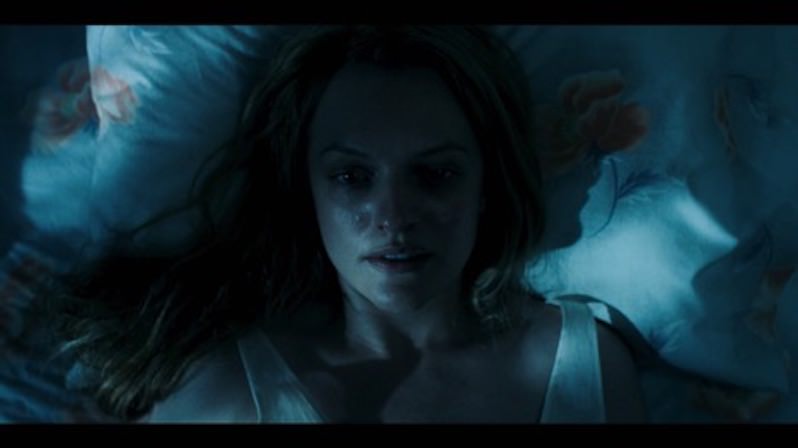 Gender trouble: Elisabeth Moss lives the nightmare as Offred in Hulu's all-too-real small-screen series based on Margaret Atwood's novel “The Handmaid’s Tale.”
Gender trouble: Elisabeth Moss lives the nightmare as Offred in Hulu's all-too-real small-screen series based on Margaret Atwood's novel “The Handmaid’s Tale.”
The United States no longer exists—at least, not as it was. In “The Handmaid’s Tale,” Hulu’s brilliant, arresting new adaptation of Margaret Atwood’s classic futuristic novel, the U.S. flag has just two stars left, the remaining “country” governed quietly from Alaska. In the lower 48, however, declining fertility rates and a vague external threat (terrorists are mentioned once, and an incident in D.C. is referenced) have birthed the Republic of Gilead, a totalitarian theocracy in which women are reduced to the sum of their parts — if their parts still work, that is.
The first three episodes of “The Handmaid’s Tale,” which will be available on the streaming platform on April 26, familiarize us with this new world through the eyes of Offred, played by “Mad Men” alumna Elisabeth Moss. Captured trying to escape to Canada with her husband and young daughter, Offred is now imprisoned as a Handmaid: a human baby-maker at the service of a “Commander” (Joseph Fiennes) and his infertile wife, Serena (Yvonne Strahovski). Babies are the driving force in this world — making them, keeping them, giving them up. A doctor who once performed abortions hangs on a wall in the town square, next to a priest and a gay man.
“This may not seem ordinary to you right now, but after a time, it will,” promises the fearsome Aunt Lydia (Ann Dowd), who inducts the Handmaids into their new lives, cattle prod purring in her hand. Dressed in their iconic red dresses and white bonnets, the women are subjected to a degrading curriculum of torture and sex-shaming. When one woman describes being raped, Lydia intones cheerily, “And whose fault is that, girls?” One by one, reluctant fingers point, and the group chants: “Her fault, her fault, her fault.”
In a flashback, our heroine complains about a college paper due on campus sexual assault. “For or against?” jokes Moira, her best friend, played by Samira Wiley. It was funny, then.
Ann Dowd brings the same terrifying, simpering piety to the role of Aunt Lydia that she gave Patti, another cult leader with a taste for latent violence, in HBO’s “The Leftovers.” The near-identicality of Dowd’s characters might be off-putting if she weren’t so utterly, viscerally scary. “Ah, you are so lucky! So privileged!” Lydia wails, clapping her hands together in holy ecstasy. Offred looks on in mute, trembling horror.
Watch closely and you may spot a cameo of Margaret Atwood herself, delivering a punctuated slap to the cheek of our girl.
The author, who serves as executive producer and is a credited writer on all 10 episodes, has long upheld that “The Handmaid’s Tale” is neither a sociological prediction nor a simple feminist tract. “If I wanted to say just one thing I would hire a billboard,” she memorably quipped in a 1986 New York Times interview. Likewise, this new “Handmaid’s” adaptation certainly never says just one thing. The series is ruthlessly nuanced, never allowing the viewer more than a moment of comfortable judgment. The series is a difficult watch — perhaps the toughest piece of television to sit through in recent memory. Rape, mutilation, execution, kidnapping and murder abound, and none of it shot with the sensational voyeurism that prestige dramas like “Game of Thrones” or “Westworld” bring to such scenes. “The Handmaid’s Tale” does not wish to titillate its viewers; it seeks to offend them.
Dystopic science fiction has long been the purview of writers who grapple with women’s and queer issues. Pioneering authors have explored the consequences of gender and sex since long before internet culture brought the word “problematic” to the millennial lexicon. “The Handmaid’s Tale” asks a classic question of speculative fiction: What becomes of humanity when our ability to reproduce is compromised? Another: In the face of potential extinction, what will society be ready to do, and undo?
The Republic of Gilead is beholden by “reproductive futurism,” a term coined by literary critic Lee Edelman to describe the idea that all human politics are driven by the desire to serve our future children, to create a better world for the next generation. For the children, for the children: This is the echo throughout “The Handmaid’s Tale,” in which even our oppressed protagonists are moved to tears by the birth of a baby. When the lives of future children are the focus of an entire civilization, any act that threatens the unborn is an uncivilized act, even if it means rolling back what was considered liberal progress. Thus birth control, abortion, sex for pleasure— these become the greatest of sins. And of course, homosexuality, transsexuality, any expression of sexuality that does not translate directly to the production of more children, is akin to blood treason.
We see the consequences of non-reproductive sexuality for both the openly gay Moira and the semi-closeted Ofglen, whose is saved—or condemned—only by her fertility: “I have two good ovaries, so they overlooked my sinful past,” deadpans Ofglen (a wonderful Alexis Bledel, nearly unrecognizable from her “Gilmore Girls” days). Ofglen’s fate is not for the weak of heart, but that’s all that’s fit to print in a spoiler-free review.It’s no surprise that Hulu’s reimagining of Gilead feels ominously timely, with its themes of patriarchy and the power of the religious right often reading like direct jabs at contemporary U.S. affairs. Even before the release of the series, Atwood’s novel has enjoyed a resurgence in the public conversation around the Trump administration and the various resistance movements and marches against it; through this contemporary lens, the story serves as a lesson in what could be if we are not careful. In March, one group of activist women wore the signature red Handmaid robes to a Texas Senate meeting in which two anti-abortion bills were passed.
But the allure of “The Handmaid’s Tale” has always been in its urgency, in the uncompromising present the story describes. When speaking about the novel in 1986, Atwood described the feeling of writing a fantasy that seemed to be merging with reality: “I started noticing that a lot of the things I thought I was more or less making up were now happening, and indeed more of them have happened since the publication of the book.”
No kidding.
Three decades later, the Hulu adaptation capitalizes on those elements that continue to feel eerily relevant, twisting the knife to remind us that more literary allusions in real life may yet happen. In one flashback, we see hordes of women taking to the streets in demonstration, protesting new laws that have stripped them of their rights, echoing the recent Women’s March that broke records this January. In the Hulu version of events, however, the protesters are met with machine-gun fire, cut down effortlessly in the face of deadlier weaponry. Again the unspoken question looms: What if?
Despite its grim subject matter, “The Handmaid’s Tale” is a beautiful piece of filmmaking. The first three episodes are directed by Reed Morano, the wünderkind cinematographer who made news in 2013 when she was admitted as the youngest member of the American Society of Cinematographers (and one of only 14 female members of the organization). Known for her work on films such as “Kill Your Darlings” and “The Skeleton Twins,” as well as Beyonce’s seminal musical and visual manifesto “Lemonade,” Reed brings a lush aesthetic to Atwood’s narrative. The screen often glows, bathed in damp light, muted greens and blues fading like old bruises on tight close-ups of Offred’s bare face. The camera moves slowly, almost reluctantly, as if through syrup; the effect is one of a dream gone bad, the kind in which you try to run but your legs are too heavy, your heart rate too slow.
Yet it is not all doom and gloom — in fact, a current of absurdist comedy runs through the series, evident in Offred’s bitterly dry narration. Did the original novel employ this much profanity? It’s hard to remember otherwise when Moss is spitting “fucks” left and right. Her Offred is a study in barely suppressed rage, an outwardly good girl whose anger still seeps out through her pores. Sometimes it erupts in a silent laugh, Offred choking back tears of mirth in her quarters. We get that laughter in music, too, when the low strings of the score occasionally break for a breath of obscene modernity, the Simple Minds’ “Don’t You Forget About Me” or Peaches’ “Fuck the Pain Away,” proudly on-the-nose numbers thrust into the mix like furious middle fingers. At the end of the first episode, Lesley Gore’s “You Don’t Own Me” soars over the credits, the classic track suddenly dripping in delectable irony: “I’m young and I love to be young / I’m free and I love to be free / To live my life the way I want / To say and do whatever I please.”
The viewer’s natural response to all this is to ask, “What would I do?” What would you do if your boss laid off every woman in the office because it was suddenly the law? What would you do, if you could be violently arrested trying to leave the country? What would you do if, when you tried to march in the streets, military police gunned you down? What would you do if your only worth was represented by your womb, if the rest of your body could be taken from you at will, your eyes, your sex, your tongue? Like Offred, the viewer is beaten into submission by the hopeless violence, the fear, the sheer brutality of this world. “The Handmaid’s Tale” frightens with deadly efficiency, the words of Aunt Lydia a constant refrain: “You are so lucky. You are so privileged.”
After all, things can still get worse.
Your support matters…Independent journalism is under threat and overshadowed by heavily funded mainstream media.
You can help level the playing field. Become a member.
Your tax-deductible contribution keeps us digging beneath the headlines to give you thought-provoking, investigative reporting and analysis that unearths what's really happening- without compromise.
Give today to support our courageous, independent journalists.



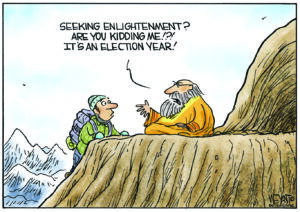
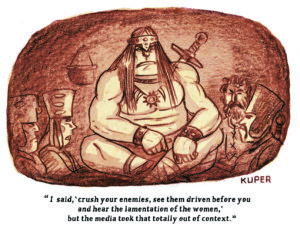
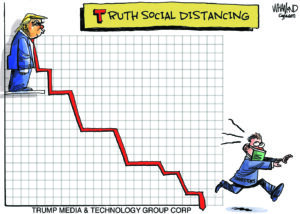
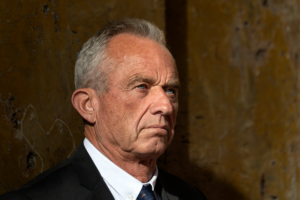


You need to be a supporter to comment.
There are currently no responses to this article.
Be the first to respond.